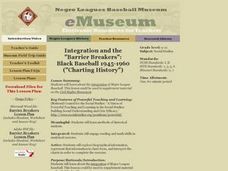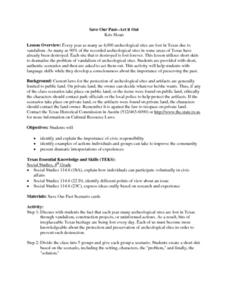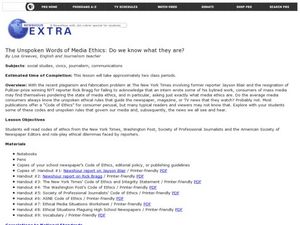Curated OER
Learning About the Civil Rights Movement Through Photographs
Students examine the racial inequality that existed in the United States before the Civil Rights Movement. After listening to song lyrics and viewing photographs, they discover the importance of the movement in helping society move...
Curated OER
Civil Rights and the Michigan Supreme Court II
Students view a PowerPoint presentation on the Michigan Supreme Court Historical Society's Civil Rights and/or the Native American Rights. They write a reaction paper and prepare for a class discussion. They work in groups and discuss...
Curated OER
Integration and the "Barrier Breakers": Black Baseball 1945-1960
Learners explore integration of Major League Baseball, identify important individual baseball players who played key roles in integration, and analyze historical information through charts, graphs, and statistics.
Curated OER
What is Suffrage? Understanding the Right to Vote
Students discover one of the restrictions forced on women of the early 1900s. In this civil rights lesson, students investigate suffrage and why women were not allowed to vote in the early twentieth century. Students create a mock...
Curated OER
Who’s Got Rights? An Introduction to Human Rights and Human Rights Defenders
Pupils explore human rights issues. In this social justice lesson, students examine human rights as they read segments of the "Universal Declaration of Human Rights," discuss photographs with human rights implications, and play a human...
Curated OER
Create Your Own Utopia
Students identify and examine the history of Utopian societies of the 19th century. They analyze the novel "The Giver" to determine whether this is a fair society or not. Students also examine the differences between Jonas' society and...
Curated OER
It's About You
Learners explore the U.S. Census and come to understand more about it. For this census lesson, students build reading confidence, explain who is counted in the census, and recognize the connection between census information and community...
Curated OER
Traditions
Students study the vocabulary of philanthropy and the tradition in their community of altruism. In this philanthropy lesson, students discuss traditions and philanthropy. They create a class dictionary of philanthropy terms and...
Curated OER
Earth: The Source of Resources
Students study responsible stewardship and natural resources. In this natural resources lesson, students share their motto's about the environment with the class. Students then discuss the regulations in 'Rules and Regulations for...
Curated OER
Philanthropy in Literature
Students define the term philanthropy and find examples of it in everyday life. In this philanthropy activity, students try to define philanthropy and illustrate it. Students then work in groups to define the term and create a web for...
Curated OER
Teams-Games-Tournaments
Young scholars review civics standards by playing a game. Each person has a specific role that they are responsible for. They answer questions on topics of leaders, authority, officials, and others.
Curated OER
Martin Luther King, Jr.
Fifth graders discuss the importance of Martin Luther King, Jr. and reflect on civic responsibilities. They brainstorm ways in which they can help to fulfill Martin Luther King, Jr.'s dream of equality among all people. Students write...
Curated OER
Evolution of the Right to Vote in Canada and Around the World
Students explore civics and develop their research skills while learning about democracy.
Curated OER
We Need Cash
Middle schoolers describe charitable, religious, and civic services in their community, and argue for the value of these services. They write a one-page explanation as to why this service is important to the community and why it deserves...
Curated OER
The Missouri Headwaters: A Confluence of Cultures
Fourth graders research and analyze how people create and change structures of power, authority and government diversity. They review their civic responsibilities. In addition, they identity the major responsibilities of local, state,...
Curated OER
Save Our Past -- Act It Out
Fourth graders identify and examine the importance of civic responsibility and the result of losing many archeological sites in Texas. In groups, they are given scenerio cards and act out each scene for the class. They also write a...
Curated OER
Building a "Toolbox for Difference"
Students discover how race and gender relate to their sense of civic obligation. As a class, they create a 3-D toolbox for making a difference in their community or the world. They write an essay to accompany it explaining the design and...
Curated OER
The Unspoken Words of Media Ethics: Do we know what they are?
Students read codes of ethics from the New York Times, Washington Post, Society of Professional Journalists and the American Society of Newspaper Editors. For this Civics lesson, 10th graders role-play ethical dilemmas faced by...
Center for Civic Education
Historical Analysis of Constitutional Amendments
Each of the 27 Amendments to the U.S. Constitution were adopted within specific economic, political, social or cultural, and international contexts. As part of their Constitution Day/Week studies, seniors investigate these factors for...
Annenberg Foundation
Controversial Issues in Practice
Wow! This resource provides three related lessons on the First Amendment that challenge US government students to explore their personal opinion on the separation of church and state. Each lesson can be adjusted in length, but is...
State Bar of Texas
McCullough v. Maryland
Can a state government tax the federal government? The Supreme Court case McCullough v. Maryland explores different governments in the United States. Scholars research the court's decision with a video and discussion. They formulate...
State Bar of Texas
Plessy v. Ferguson
Where did separate but equal originate and what does it mean? Scholars investigate the Supreme Court Case Plessy v. Ferguson. Using a short video clip, they analyze the impact the decision of legal segregation had on society in 1896....
State Bar of Texas
Schenck v. US
Freedom of speech is absolute—or is it? The Supreme Court case Schenck v. United States has learners research what free speech really looks like. A short video along with paired work creates open discussion and thought on what speech is...
State Bar of Texas
Sweatt v. Painter
Is separate but equal actually equal? The 1950 Supreme Court case Sweatt v. Painter discusses the law of segregation and inequality. Scholars investigate the impact of the case on the desegregation of public schools across the nation...
Other popular searches
- Civics and Economics
- Introduction to Civics
- Social Studies Civics
- Civics Political Cartoons
- Civics Project
- Civics Lesson Plans
- American Civics
- Civics Business
- Civics Civil War
- Civics Citizen
- U.s. American Civics
- Civics 2008 Election























